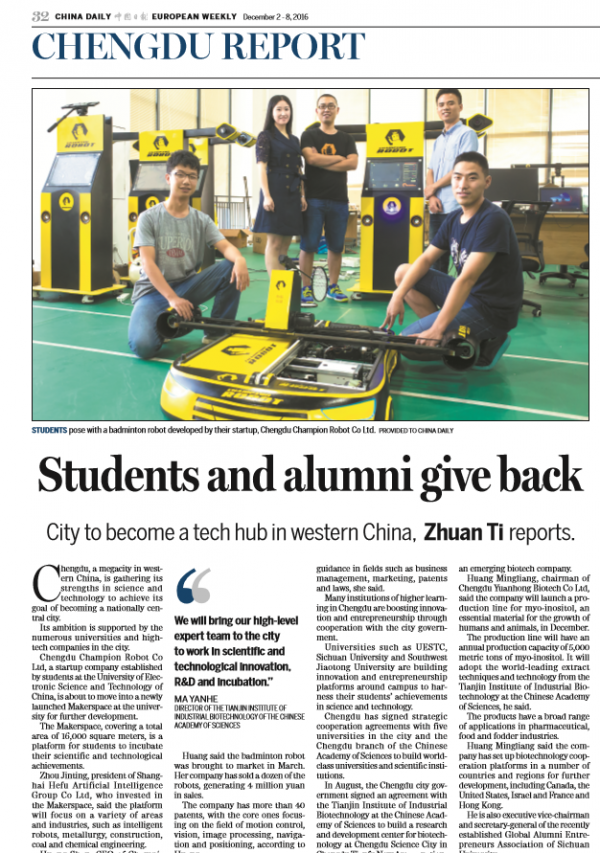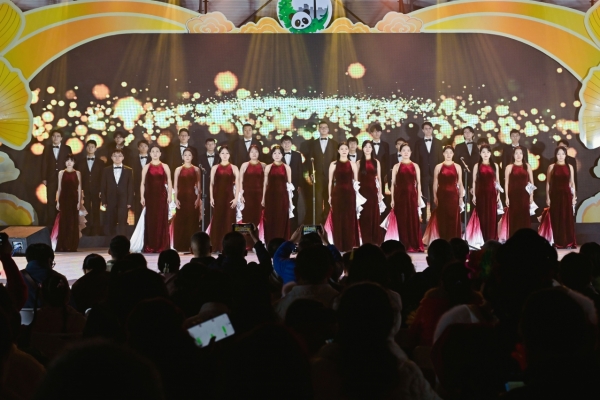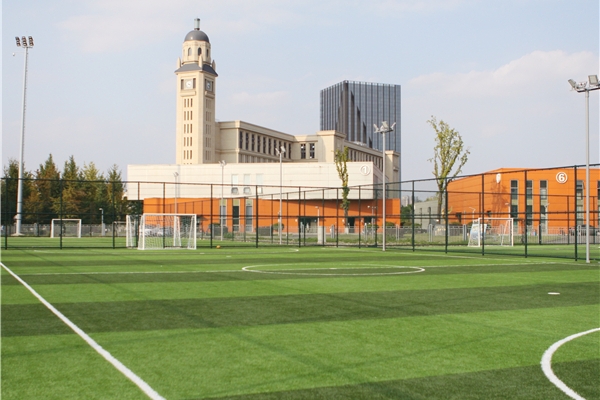即可将网页分享至朋友圈
12月2日,《中国日报》欧洲版第32版刊发整版专题报道,聚焦成都西部科技中心建设。其中,题为"Students and alumni give back"的文章重点介绍了电子科技大学“众创空间”正式启用,推动学生创新创业工作的情况,以及成都与各大高校、科研院所合作共谋发展的最新成果,体现了成都建设国家中心城市的科技实力。
文章反映出成都正通过将自身打造成为西部科技中心,助力实现国家中心城市的新目标。成都众多高校和高新技术企业将为这一目标提供重要支撑。成都电科创品机器人科技有限公司即将入驻电子科技大学启用的“众创空间”。今年4月李克强总理在川考察期间,曾应邀与该公司设计的机器人对打羽毛球。成都已分别与5所在蓉高校,以及中科院成都分院签署战略合作协议,共建世界一流高校和科研院所。《中国日报》欧洲版每周五发行,发行范围覆盖整个欧洲。
报道内容如下:

Chengdu, a megacity in western China, is gathering its strengths in science and technology to achieve its goal of becoming a nationally central city.
Its ambition is supported by the numerous universities and high-tech companies in the city.
Chengdu Champion Robot Co Ltd, a startup company established by students at the University of Electronic Science and Technology of China, is about to move into a newly launched Makerspace at the university for further development.
The Makerspace, covering a total area of 16,000 square meters, is a platform for students to incubate their scientific and technological achievements.
Zhou Jinting, president of Shanghai Hefu Artificial Intelligence Group Co Ltd, who invested in the Makerspace, said the platform will focus on a variety of areas and industries, such as intelligent robots, metallurgy, construction, coal and chemical engineering.
Huang Shan, CEO of Champion Robot, said her company had received a 5 million yuan ($726,333) angel investment from Hefu Artificial Intelligence Group, and it expects to raise 20 million yuan of investment in the first round of financing.
During his visit to Chengdu in April, Premier Li Keqiang played badminton with a robot designed by the company.
Huang said the badminton robot was brought to market in March. Her company has sold a dozen of the robots, generating 4 million yuan in sales.
The company has more than 40 patents, with the core ones focusing on the field of motion control, vision, image processing, navigation and positioning, according to Huang.
She said her company is planning to apply the technology to a wider area and develop more robot products with different functions.
"Moving into the Makerspace will save costs and help us to bring new products to the market," she said.
The university has established an institute of innovation and entrepreneurship to provide students who are starting a business with guidance in fields such as business management, marketing, patents and laws, she said.
Many institutions of higher learning in Chengdu are boosting innovation and entrepreneurship through cooperation with the city government.
Universities such as UESTC, Sichuan University and Southwest Jiaotong University are building innovation and entrepreneurship platforms around campus to harness their students' achievements in science and technology.
Chengdu has signed strategic cooperation agreements with five universities in the city and the Chengdu branch of the Chinese Academy of Sciences to build world-class universities and scientific institutions.
In August, the Chengdu city government signed an agreement with the Tianjin Institute of Industrial Biotechnology at the Chinese Academy of Sciences to build a research and development center for biotechnology at Chengdu Science City in Chengdu Tianfu New Area, a national-level new area.
"We don't merely bring our technologies to Chengdu," said Ma Yanhe, director of the institute. "We will bring our high-level expert team to the city to work in scientific and technological innovation, R&D and incubation."
Previously, the institute transferred some patent technologies to Chengdu Yuanhong Biotech Co Ltd, an emerging biotech company.
Huang Mingliang, chairman of Chengdu Yuanhong Biotech Co Ltd, said the company will launch a production line for myo-inositol, an essential material for the growth of humans and animals, in December.
The production line will have an annual production capacity of 5,000 metric tons of myo-inositol. It will adopt the world-leading extract techniques and technology from the Tianjin Institute of Industrial Biotechnology at the Chinese Academy of Sciences, he said.
The products have a broad range of applications in pharmaceutical, food and fodder industries.
Huang Mingliang said the company has set up biotechnology cooperation platforms in a number of countries and regions for further development, including Canada, the United States, Israel and France and Hong Kong.
He is also executive vice-chairman and secretary-general of the recently established Global Alumni Entrepreneurs Association of Sichuan University.
He said the association will gather and integrate global sources in the biopharmaceutical field through the influence of the university and its alumni entrepreneurs, so as to boost international cooperation and help to develop the biological industries in Chengdu.
译文:
中国西部大都市成都正蓄势待发为其成为中国核心城市的目标而集聚科学技术之力量。
成都众多高校和高新技术企业将为这一目标提供重要支撑。
电子科技大学学生新创立的成都电科创品机器人科技有限公司即将入驻电子科技大学为长久发展而启动的“众创空间”。
“众创空间”占地面积16000平方米,是孵化学生科学技术成就的平台。
“众创空间”的投资人上海荷福控股(集团)有限公司董事长周锦霆说该平台将会专注于许多行业,例如,智能机器人、冶金行业、建筑业、煤矿业和化学工程等。
创品机器人CEO黄山说她的公司已经收到来自上海荷福控股(集团)有限公司天使投资资金5百万元人民币(726,333$),预计在第一轮融资中收到达2千万元投资资金。
李克强今年4月首次到访成都时曾与该公司开发的机器人打过羽毛球。
黄山说羽毛球机器人在3月时已经上市了。她的公司已经售出十几台机器人,销售额达4百万元人民币。
黄山说他的公司拥有40项专利,专利主要集中于运动控制、视觉、图像处理、导航和定位技术。
她说公司将运用其技术到更广的领域中,并研发出更多功能不同的机器人产品。
她还说:“入驻‘创客空间’能节省大量成本并帮助我们开发更多新产品投放到市场上”。
她表示,电子科技大学为其学生提供在各行各业创业指导而建立了创新创业机构,包括工商管理、市场营销、专利与法律方面的指导等。
许多成都高校学府都和成都政府携手合作共同推动创新创业。
电子科技大学、四川大学和西南交通大学等高校都在校内外建立起了创新创业平台以帮助他们的学生在科技领域取得成就。
成都已分别与5所在蓉高校,以及中科院成都分院签署战略合作协议,共建世界一流高校和科研院所。
成都市政府8月与中国科学院天津工业生物技术研究所签订在成都国家级新区---天府新区科技城建立生物化学研发中心的协议。
该研究所主任马延和说:“我们不仅要将技术引进成都,还要将我们高水平专家团队引进成都助力其科技创新、研发和孵化”。
该研究所之前曾转移几项技术专利给成都一家新兴的生物科技空司----成都元泓生物科技有限公司。
成都元泓生物科技有限公司主席黄明良说他的公司将于12月推出人类和动物发育生长必需物质肌醇的生产线。
该生产线年生产量将达5000吨肌醇。该生产线将采用世界先进的提取技术和中国科学院天津工业生物技术研究所技术。
此产品将广泛应用于制药业、食品和饲料业。
黄明良说,为进一步发展他公司将和许多国家和地区建立起生物科技合作平台,其中包括加拿大、美国、以色列、法国和香港。
他也担任最近成立的四川大学全球校友创业家联谊会常务副主席和秘书长职务。
他说该联谊会将借助四川大学和四川大学校友企业家的影响力整合全球生物制药领域资源,加大国际间合作助力成都生物行业的发展。
报道链接:
http://europe.chinadaily.com.cn/epaper/2016-12/02/content_27545461.htm
编辑:林坤 / 审核:罗莎 / 发布:林坤


